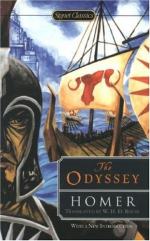“Perverse mankind! whose wills, created free,
Charge all their woes on absolute degree;
All to the dooming gods their guilt translate,
And follies are miscall’d the crimes of fate.
When to his lust AEgysthus gave the rein,
Did fate, or we, the adulterous act constrain?
Did fate, or we, when great Atrides died,
Urge the bold traitor to the regicide?
Hermes I sent, while yet his soul remain’d
Sincere from royal blood, and faith profaned;
To warn the wretch, that young Orestes, grown
To manly years, should re-assert the throne.
Yet, impotent of mind, and uncontroll’d,
He plunged into the gulf which Heaven foretold.”
Here paused the god; and pensive thus replies
Minerva, graceful with her azure eyes:
“O thou! from whom the whole creation springs,
The source of power on earth derived to kings!
His death was equal to the direful deed;
So may the man of blood be doomed to bleed!
But grief and rage alternate wound my breast
For brave Ulysses, still by fate oppress’d.
Amidst an isle, around whose rocky shore
The forests murmur, and the surges roar,
The blameless hero from his wish’d-for home
A goddess guards in her enchanted dome;
(Atlas her sire, to whose far-piercing eye
The wonders of the deep expanded lie;
The eternal columns which on earth he rears
End in the starry vault, and prop the spheres).
By his fair daughter is the chief confined,
Who soothes to dear delight his anxious mind;
Successless all her soft caresses prove,
To banish from his breast his country’s love;
To see the smoke from his loved palace rise,
While the dear isle in distant prospect lies,
With what contentment could he close his eyes!
And will Omnipotence neglect to save
The suffering virtue of the wise and brave?
Must he, whose altars on the Phrygian shore
With frequent rites, and pure, avow’d thy power,
Be doom’d the worst of human ills to prove,
Unbless’d, abandon’d to the wrath of Jove?”
“Daughter! what words have pass’d thy
lips unweigh’d!
(Replied the Thunderer to the martial maid;)
Deem not unjustly by my doom oppress’d,
Of human race the wisest and the best.
Neptune, by prayer repentant rarely won,
Afflicts the chief, to avenge his giant son,
Whose visual orb Ulysses robb’d of light;
Great Polypheme, of more than mortal might?
Him young Thousa bore (the bright increase
Of Phorcys, dreaded in the sounds and seas);
Whom Neptune eyed with bloom of beauty bless’d,
And in his cave the yielding nymph compress’d
For this the god constrains the Greek to roam,
A hopeless exile from his native home,
From death alone exempt—but cease to mourn;
Let all combine to achieve his wish’d return;
Neptune atoned, his wrath shall now refrain,
Or thwart the synod of the gods in vain.”




